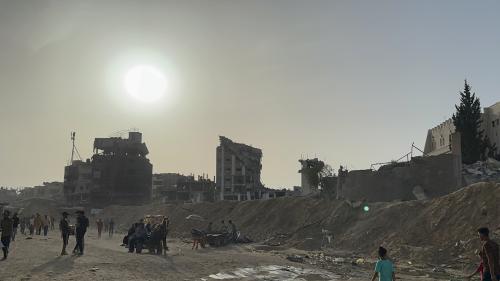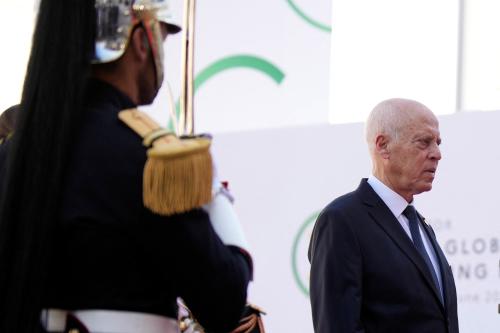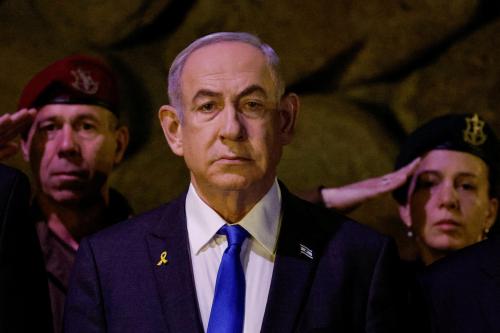TAVIS SMILEY: President Bush yesterday addressed the UN General Assembly to rally support for a deliberate transition to democracy in Iraq. Support, however, has been sparse. A year ago, few members of the UN Security Council backed Bush’s case against Iraqi dictator Saddam Hussein when the US went to war, but how much has changed since then and did the president’s call for a larger UN role in Iraq’s reconstruction fall on deaf ears?
Joining us from Washington is Susan Rice, senior fellow of foreign policy at The Brookings Institution and former assistant secretary of State for African affairs under President Clinton. Susan, nice to talk to you, as always.
Also with us, Bill Smullen, former chief of staff to Colin Powell and deputy director of the Maxwell School’s National Security Studies program. Bill, glad to have you on as well.
Susan, so what did you make of the president’s speech yesterday?
RICE: Well, I think it was, on the whole, something of a missed opportunity. But it also, on the other hand, wasn’t as bad as some might have predicted. The problem is we’re in a hole. We are in a financial hole. We’re in a troop hole because we can’t manage the Iraqi military operation almost exclusively by ourselves. And we’re in a hole in terms of goodwill with others in the international community. The president had an opportunity to begin digging out of that hole and I don’t think he took that opportunity. On the other hand, I don’t think he dug us in any deeper.
SMILEY: He might not have dug us in any deeper, Bill, but I also get the sense that the president didn’t exactly extend an olive branch, which some expected he was going to do. Do you think he could have done more of that or should have done more of that?
SMULLEN: Well, first of all, he was facing a very skeptical audience and an audience that was not inclined to agree with him, regardless of what he said. But I do think that he stated his case. He established the boundaries within which he’s asking for the UN to become more involved in the rebuilding of Iraq. And I honestly believe that the best advances will be made today and in the days and weeks to come by virtue of the bilateral diplomatic initiatives that have to be taken and in the dialogue that has to be established with our friends and allies around the world. It’s not going to be done in a public forum like the president faced yesterday. I think diplomacy is best done in back rooms, and that’s what Colin Powell and the president are going to do today and in the future.
SMILEY: Before I advance to some other issues I want to cover here, Susan, let me stay with this notion of this olage branch—olive branch, rather, that I raised a moment ago because I’m curious as to whether or not you think strategically he went about this the right way. Again, there were some who expected that he was going to do more in giving a little bit, shall we say, in terms of his speech. I hear Bill’s point that he was, in fact, speaking to a skeptical audience. But I wonder whether or not he should have eaten a little bit more crow, so to speak.
RICE: Well, I (technical difficulties) in fact were serious about wanting to internationalize the burden in Iraq. If we want other people’s troops to take the bullets that are flying, but side by side with us, if we want other people’s money, we’re going to have to compromise. And unfortunately, what we’re going to have to give up in the process of compromising is more now than it might have been six or nine months ago if we had succeeded in building a coalition that backed us going into Iraq.
I think Bill’s right. There’s important work to be done behind the scenes in bilateral meetings, but the president could have used this opportunity to set a more open-minded and conciliatory tone and he didn’t do that. And I think that’s the olive branch you’re talking about that could have been useful. It certainly wouldn’t have hurt.
SMILEY: Bill, front room or back room, Jacques Chirac of France#151;the president of France, of course#151;has been very, very outspoken publicly about his disappointment and about what he thinks the strategy ought to be, saying, and I quote, “No one can act alone in the name of all,” close quote. So again, whether you’re talking front room or back room, a lot of these folks still aren’t feeling President Bush and his strategy, never mind his speech yesterday.
SMULLEN: Well, this is true. And no one likes a bully and I think a lot of the countries around the world see the US as a bully, going in alone, doing it unilaterally. And quite honestly I think our lessons of the past show that you can attempt to do it that way but it’s not always going to be in your best interest. But we are where we are, and we need to get moving forward and we need the cooperation of not just France and Germany and Russia, but we need the United Nations as a body and countries throughout the world to get more involved, whether it be with dollars or with troops or with just a commitment in kind. But we have got to enlist their services. And the president and the secretary of State are going to be charged with doing that. So they’ve got a tough hill to climb, but I know that they are going to be up to the task.
SMILEY: Susan, let’s talk timetable here. The president was very clear in suggesting that the transformation of Iraq to a democracy would neither be hurried nor delayed. How does his timetable affect his chances of getting the UN to play a bigger role in Iraq’s reconstruction?
RICE: Well, I think this is the area potentially around which there’s room for negotiation. I mean, we have, you know, a notion that#151;’not too quick and not too slow.’ I think we could be a bit more specific about what we envision that time line to be. The French have another time line, which I think the administration is right to call unrealistic. And somewhere between the two may be the path to compromise. Our position is further complicated by the fact that the Iraqi Governing Council, which we ourselves appointed, are now opposing our notional time line as being too long. And so now they’re in effect on the side of the French. So we have some difficult negotiations to do to demonstrate that we’re prepared, in a reasonable time frame but, indeed, not too fast, to cede sovereignty.
SMILEY: Bill, the president in his speech also talked about how much money he was prepared to spend on reconstructing Iraq. That, of course, depends on his getting this $87 billion that he’s asked Congress to give him additionally. I don’t know this is likely not to happen, but what happens if he doesn’t get the money from Congress? How does that affect what he’s asking UN allies to give up in terms of money?
SMULLEN: Well, if he doesn’t get the $87 billion, it’s just going to slow down the process of the rebuilding in Iraq. But more importantly it’s probably going to cause countries to be less willing to give their own money. This upcoming donors’ conference is going to be critical to this cause, and I think we’ve got to make our case and we have just got to present to these countries the rationale for why it’s in their best interest. And I might just say that this is not just about Iraq. This is about the entire region. We need to get stability in that region of the world and it’s in the best interest of the civilized world for us to do that. So there is a domino effect here if we get things rolling in a positive way.
SMILEY: To your point, Bill, that this is not just about Iraq, but indeed about that region of the world. And I wonder whether or not you think, if for no other reason, that the allies will eventually come around, Bill, because of that rationale, because of that logic?
SMULLEN: Well, I do think that#151;it’s going to take time, but I do think that people are going to understand that if we are going to not just live more harmoniously in this world that seems to grow smaller every day, we have all got to make a contribution. And as the president has said repeatedly, this is about a threat to the world. This is not just about a threat to the United States, 9/11-like threat. This is about terrorism that resides in at least 60 countries around the world. So this does have an impact and an effect on countries around the world.
SMILEY: Surprise, surprise. Susan, criticism from Senate Minority Leader Tom Daschle, who has said that the president missed an opportunity to ask for more troops and more resources and failed to do so. I guess the question for you is: What’s most significant here to help build democracy in Iraq? Who’s right: the Republicans, Democrats? What’s the most important strategy here?
RICE: Well, we need resources, obviously, and we need a plan. What we haven’t had is any kind of comprehensive postwar plan, either for building democracy in Iraq from the bottom up or for securing the situation and getting the economy going again. But, Tavis, we’ve got to come back to something fundamental. The president is asking Congress for $87 billion, $20 billion of which approximately is for reconstruction. That is only a part of the whole that we need for reconstruction. We are in effect counting on our friends and allies to provide another $40 billion for reconstruction. That’s a huge amount of money. Congress is balking at the $20 billion for our share and we’re asking others for $40 billion. So if we’re going to get $40 billion out of other countries, we’re going to have to give a whole lot more than just some nice rhetoric about why we need the Middle East to be peaceful. They’re going to have to get something in it for them, whether it’s authority, responsibility, contract, something. So we’re in a real dealing situation here and we better be willing to trade a few cards here.
SMILEY: Got about 20 seconds left for you each. Obviously, this process is going to be a lot more difficult than this simplistic question. But on a scale of one to 10, Bill, 10 being very likely, how likely is it that we’re going to get some unity here in the UN for the Bush administration on this matter?
SMULLEN: Well, probably in the seven to eight range. I mean, we have just got to find the ability to include folks in this process, and so the art of compromise is going to be critical and key to all of this.
SMILEY: Susan?
RICE: I say eight. Likely to get a resolution, but very questionable as to whether that resolution will yield the troops and the money we need, and that’s what we have to do the diplomatic work to get.
SMILEY: Susan Rice is senior fellow of foreign policy at The Brookings Institution and the former assistant secretary of State for African affairs under President Clinton. Bill Smullen, former chief of staff to Secretary of State Colin Powell and deputy director of the Maxwell School’s National Security Studies program. As always, nice to talk to you both.



Commentary
Bush’s Address to the World Leaders of the UN
September 24, 2003